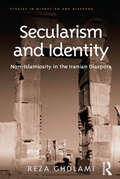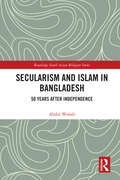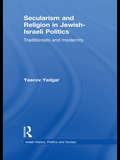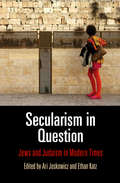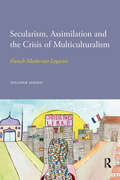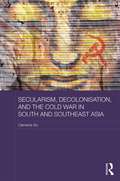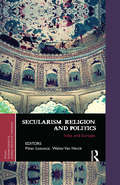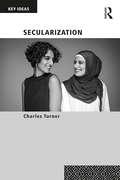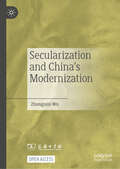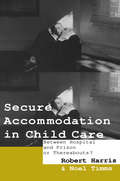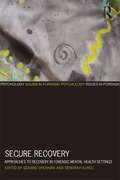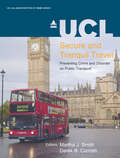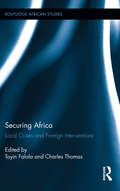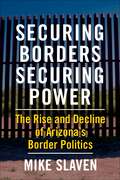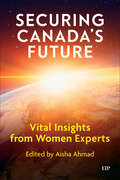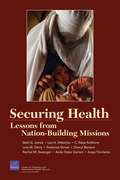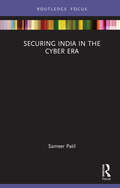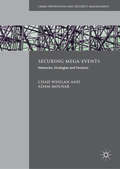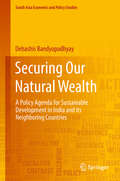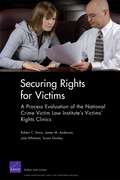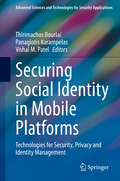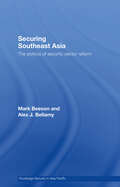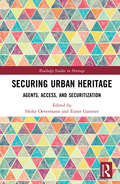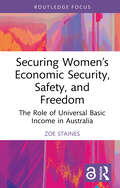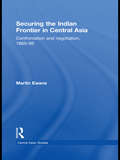- Table View
- List View
Secularism and Identity: Non-Islamiosity in the Iranian Diaspora (Studies in Migration and Diaspora)
by Reza GholamiWithin western political, media and academic discourses, Muslim communities are predominantly seen through the prism of their Islamic religiosities, yet there exist within diasporic communities unique and complex secularisms. Drawing on detailed interview and ethnographic material gathered in the UK, this book examines the ways in which a form of secularism - ’non-Islamiosity’ - amongst members of the Iranian diaspora shapes ideas and practices of diasporic community and identity, as well as wider social relations. In addition to developing a novel theoretical paradigm to make sense of the manner in which diasporic communities construct and live diasporic identity and consciousness in a way that marginalises, stigmatises or eradicates only ’Islam’, Secularism and Identity shows how this approach is used to overcome religiously inculcated ideas and fashion a desirable self, thus creating a new space in which to live and thereby attaining ’freedom’. Calling into question notions of anti-Islamism and Islamophobia, whilst examining secularism as a means or mechanism rather than an end, this volume offers a new understanding of religion as a marker of migrant identity. As such it will appeal to scholars of sociology, anthropology and political science with interests in migration and ethnicity, diasporic communities, the sociology of religion and emerging forms of secularism.
Secularism and Islam in Bangladesh: 50 Years After Independence (Routledge South Asian Religion Series)
by Abdul WohabSecularism and Islam in Bangladesh comprehensively analyses the syncretistic form of Bengali Islam and its relationship with secularism in Bangladesh from pre-British to contemporary times. It focuses on the importance of understanding the dynamics between religion and secularism within specific cultural contexts. The author draws upon historical, sociological, and political literature, Bangladeshi electoral results, newspaper reports, and elite interviews with political commentators and offers a rich historical and empirical analysis. Arguing that extremist interpretations of Islam, which aim to establish a theocratic state, have not been able to influence the pluralistic religious and cultural life of Bangladesh substantially, the book shows that religious and cultural pluralism will continue to thrive despite the apparent threat posed by increasing religiosity among Bangladeshi Muslims. This book is a timely and significant contribution to the discourse on secularism and Islam, with relevance beyond Bangladesh and the wider Islamic world. It will appeal to scholars and researchers working in the fields of South Asian Studies, Asian Religions, and the Sociology of Religion.
Secularism and Religion in Jewish-Israeli Politics: Traditionists and Modernity (Israeli History, Politics and Society)
by Yaacov YadgarCommon discourse on Jewish identity in Israel is dominated by the view that Jewish Israelis can, and should, be either religious or secular. Moving away from this conventional framework, this book examines the role of secularism and religion in Jewish society and politics. With a focus on the ‘traditionists’ (masortim) who comprise over a third of the Jewish-Israeli population, the author examines issues of religion, tradition and secularism in Israel, giving a fresh approach to the widening theoretical discussion regarding the thesis of secularisation and modernity and exploring the wider implications of this identity. Yadgar’s conclusions have significant social, cultural and political implications, serving not only as a new contribution to the academic discourse on Jewish-Israeli identity, but as a platform upon which traditionist positions on central issues of Israeli politics can be heard. Offering a detailed investigation into a central and important Jewish-Israeli identity construct, the book is relevant not only to the study of Jewish identity in Israel but also within the wider social-theoretical issues of religion, tradition, modernity and secularization. The book will be of great interest to students of Israeli society and to anyone looking into the issues of Jewish identity, Israeli nationalism and ethnicity, religion and politics in Israel, and the sociology of religion.
Secularism in Question: Jews and Judaism in Modern Times (Jewish Culture and Contexts)
by Ari Joskowicz Ethan B. KatzFor much of the twentieth century, most religious and secular Jewish thinkers believed that they were witnessing a steady, ongoing movement toward secularization. Toward the end of the century, however, as scholars and pundits began to speak of the global resurgence of religion, the normalization of secularism could no longer be considered inevitable. Recent decades have seen the strengthening of Orthodox movements in the United States and in Israel; religious Zionism has grown and radically changed since the 1960s, and new and vibrant nondenominational Jewish movements have emerged.Secularism in Question examines the ways these contemporary revivals of religion prompt a reconsideration of many issues concerning Jews and Judaism from the early modern era to the present. Bringing together scholars of history, religion, philosophy, and literature, this volume illustrates how the categories of "religious" and "secular" have frequently proven far more permeable than fixed. The contributors challenge the problematic assumptions about the development of secularism that emerge from Protestant European and American perspectives and demonstrate that global Jewish experiences necessitate a reappraisal of conventional narratives of secularism. Ultimately, Secularism in Question calls for rethinking the very terms that animate many of the most contentious debates in contemporary Jewish life and far beyond.Contributors: Michal Ben-Horin, Aryeh Edrei, Jonathan Mark Gribetz, Ari Joskowicz, Ethan B. Katz, Eva Lezzi, Vivian Liska, Rachel Manekin, David Myers, Amnon Raz-Krakotzkin, Andrea Schatz, Christophe Schulte, Daniel B. Schwartz, Galili Shahar, Scott Ury.
Secularism, Assimilation and the Crisis of Multiculturalism: French Modernist Legacies (IMISCOE Research)
by Yolande JansenThis remarkable study develops a theoretical critique of contemporary discourses on secularism and assimilation, arguing that the perspective of assimilating distinct religious minorities by incorporating them into a secular and supposedly neutral public sphere may be self-subverting. To flesh out this insight, Jansen draws on the paradoxes of assimilation as experienced by the French Jews in the late 19th century through a contextualised reading of Proust's In Search of Lost Time. She proposes a dynamic, critical multiculturalism as an alternative to discourses focusing on secularism, assimilation and integration.
Secularism, Decolonisation, and the Cold War in South and Southeast Asia: Engaging The Believers (Routledge Studies in the Modern History of Asia)
by Clemens SixThe intensifying conflicts between religious communities in contemporary South and Southeast Asia signify the importance of gaining a clearer understanding of how societies have historically organised and mastered their religious diversity. Based on extensive archival research in Asia, Europe, and the United States, this book suggests a new approach to interpreting and explaining secularism not as a Western concept but as a distinct form of practice in 20th-century global history. In six case studies on the contemporary history of India, Indonesia, Malaysia, and Singapore, it analyses secularism as a project to create a high degree of distance between the state and religion during the era of decolonisation and the emerging Cold War between 1945 and 1970. To demonstrate the interplay between local and transnational dynamics, the case studies look at patterns of urban planning, the struggle against religious nationalism, conflicts around religious education, and (anti-)communism as a dispute over secularism and social reform. The book emphasises in particular the role of non-state actors as key supporters of secular statehood – a role that has thus far not received sufficient attention. A novel approach to studying secularism in Asia, the book discusses the different ways that global transformations such as decolonisation and the Cold War interacted with local relations to reshape and relocate religion in society. It will be of interest to scholars of Religious Studies, International Relations and Politics, Studies of Empire, Cold War Studies, Subaltern Studies, Modern Asian History, and South and Southeast Asian Studies.
Secularism, Religion, and Politics: India and Europe (Ethics, Human Rights and Global Political Thought)
by Péter Losonczi Walter Van HerckThis book highlights the relationship between the state and religion in India and Europe. It problematizes the idea of secularism and questions received ideas about secularism. It also looks at how Europe and India can learn from each other about negotiating religious space and identity in this globalised post-9/11 world.
Secularization (Key Ideas)
by Charles Turner‘Secularization’ sounds simple, a decline in the power of religion. Yet, the history of the term is controversial and multi-faceted; it has been useful to both religious believers and non-believers and has been deployed by scholars to make sense of a variety of aspects of cultural and social change. This book will introduce the reader to this variety and show how secularization bears on the contemporary politics of religion. Secularization addresses the sociological classics’ ambivalent accounts of the future of religion, later and more robust sociological claims about religious decline, and the most influential philosophical secularization thesis, which says that the dominant ideas of modern thought are in fact religious ones in a secularized form. The book outlines some shortcomings of these accounts in the light of historical inquiry and comparative sociology; examines claims that some religions are ‘resistant to secularization’; and analyzes controversies in the politics of religion, in particular over the relationship between Christianity and Islam and over the implicitly religious character of some modern political movements. By giving equal attention to both sociological and philosophical accounts of secularization, and equal weight to ideas, institutions, and practices, this book introduces complicated ideas in a digestible format. It will appeal to students and scholars interested in making unusual connections within sociology, anthropology, philosophy, theology, and political theory.
Secularization and China's Modernization
by Zhongmin WuThis open access book examines from the perspective of secularization. Since the publication of Max Weber's Protestant Ethics and the Spirit of Capitalism, how to realize modernization in developing countries has become an urgent problem to be demonstrated. Secularization has becoming endogenous power for Chinese modernization procedure, especially since 1978. However, to understand the foundation of secularization, it is inevitable to tracing back to Chinese history. This approach contains critical analysis and profound insight to illuminate the essence of secularization in contemporary Chinese context. The author also applies the comparative approach: by comparing with Protestant ethics in many Western European countries, the significance of secularization has been emphasized. The widespread and intense secularization boosts China into the trend modernization that covers nearly all aspects of society. This book is in need for those who intended to discern the truth of Chinese modernization. It is also a key tool of reflecting modernization and development in a broader sense.
Secure Accommodation in Child Care: 'Between Hospital and Prison or Thereabouts?'
by Robert Harris Professor Noel Timms Noel TimmsFor some children secure accommodation seems to be the only way to control their disparate number of "problems". But why is this so, and from what criteria do social work professionals decide that a child should be put into secure accommodation? In Secure Accommodation in Child Care the authors use an empirical study of secure accommodation as a basis for an analysis of the relations between the state, the family and the "difficult" child. By looking at court procedures, social workers and the children themselves they explain how professionals and children make sense of their worlds, and how they translate that "sense" into personal or professional action. Secure Accommodation in Child Care is essential reading for social service managers, social policy makers, social workers and health care professionals as well as for students and lecturers of social policy and social work.
Secure Recovery: Approaches to Recovery in Forensic Mental Health Settings
by Gerard Drennan Deborah AlredSecure Recovery is the first text to tackle the challenge of recovery-oriented mental health care in forensic services and prison-based therapeutic communities in the UK. Recovery as an emergent paradigm in the field of mental health presents a challenge to all services to embrace a new clinical philosophy, but nowhere are the implications more profound than in services that are designed to meet the needs of mentally disordered and personality-disordered offenders, both men and women. The chapters collected together in this book represent a cross-section of experiences in high, medium and low secure services and prison-based therapeutic communities in England and Scotland that have begun to implement a recovery orientation to the rehabilitation of offenders with mental health needs. Secure Recovery sets out a road map of guiding principles, practical and evidence-based strategies for promoting service user participation in their care and treatment and further demonstrates the adaption of traditional treatment approaches, and the development of innovations in rehabilitation, as well as tackling training for staff teams, and the evaluation of service delivery. This book provides a valuable resource and an inspiration to practitioners working across forensic mental health settings, increasing understanding of contemporary challenges and suggesting ways of moving forward.
Secure and Tranquil Travel
by Derek B. Cornish Martha J. SmithHerein lie the answers to crime and disorder. So many people become dispirited, fatalistic or angry about crime instead of seeing crime problems, like business setbacks, as challenges or even opportunities. This book sets out a clear, systematic and demonstrably successful strategy for reducing the temptations and opportunities for crime. You cannot change the travelling public or the communities which public transport serves, but you can change the immediate circumstances and surroundings that you present to people, you can re-think and reinvigorate your service offering, you can recruit help from other agencies, from staff and even those who ride the system, and you can make the transition from being reactive to being ahead of the game. The theory is backed up by concrete examples of how and why and where smart-thinking has worked before to outflank crime-this is not just off-the-shelf self-help philosophy but a compendium of real-world best practice. What's more, you can often make money, or at least save a lot of money, by doing the right thing, and this book tells you how. Nick Ross,BBC Crimewatch UK, Chairman, UCL Jill Dando Institute of Crime Science Advisory Board
Securing Africa: Local Crises and Foreign Interventions (Routledge African Studies #12)
by Toyin Falola Charles ThomasAfrica has been and currently is the site of numerous conflicts and crises. Authors previously wrote of these as specifically African problems or the problems of Europeans in Africa, but newer scholarship on other aspects of Africa has come to stress the interconnectness of Africa and the wider world. Still, it has often been limited to studies of isolated instances within African countries, with little-to-no connection to greater patterns of international power and violence. This volume explores the historical and present local and international dimensions of the myriad security crises in Africa, from the role of international relations during liberation to multination efforts against piracy.
Securing Borders, Securing Power: The Rise and Decline of Arizona's Border Politics
by Mike SlavenIn 2010 Arizona enacted Senate Bill 1070, the notorious “show-me-your-papers” law. At the time, it was widely portrayed as a draconian outlier; today, it is clear that events in Arizona foreshadowed the rise of Donald Trump and underscored the worldwide trend toward the securitization of migration—treating immigrants as a security threat. Offering a comprehensive account of the SB 1070 era in Arizona and its fallout, this book provides new perspective on why policy makers adopt hard-line views on immigration and how this trend can be turned back.Tracing how the issue of unauthorized migration consumed Arizona state politics from 2003 to 2010, Mike Slaven analyzes how previously extreme arguments can gain momentum among politicians across the political spectrum. He presents an insider account based on illuminating interviews with political actors as well as historical research, weaving a compelling narrative of power struggles and political battles. Slaven details how politicians strategize about border politics in the context of competitive partisan conflicts and how securitization spreads across parties and factions. He examines right-wing figures who pushed an increasingly extreme agenda; the lukewarm center-right, which faced escalating far-right pressure; and the nervous center-left, which feared losing the center to border-security appeals—and he explains why the escalation of securitization broke down, yielding new political configurations. A comprehensive chronicle of a key episode in recent American history, this book also draws out lessons that Arizona’s experience holds for immigration politics across the world.
Securing Canada’s Future: Vital Insights from Women Experts (UTP Insights)
by Aisha AhmadAfter decades of uncontested dominance, the era of American hegemony is ending and a new multipolar world order is emerging in its place. This transformation is also occurring alongside uncontrolled climate change and the development of volatile new technologies. Together, these factors dramatically complicate the global threat landscape. Securing Canada’s Future offers a comprehensive analysis of the most serious challenges that Canada will face in the near future. Written by leading Canadian women scholars and security experts, this collection covers the most critical risks and threats on the horizon, including rising Chinese power, resurgent Russian aggression, escalating competition in the Arctic, the near irreversibility of climate change, disaster management and mitigation, evolving cybersecurity threats, and gendered violence. Securing Canada’s Future explores what this future threat landscape will look like for Canadians and shows how Canada can prepare for and mitigate upcoming risks. This practical, forward-thinking volume maps out the most urgent national and international security issues that Canada is destined to face in the foreseeable future.
Securing Health: Lessons from Nation-building Operations
by Seth G. Jones Lois M. Davis Federico Girosi Lee H. Hilborne C. Ross AnthonyRAND researchers analyzed the health components of seven post-World War II nation-building efforts conducted after major conflicts--Germany, Japan, Somalia, Haiti, Kosovo, Afghanistan, Iraq--and found that two factors are correlated with successful health outcomes: planning and coordination, and infrastructure and resources.
Securing India in the Cyber Era (The Gateway House Guide to India in the 2020s)
by Sameer PatilThis book explores the geopolitics of the global cyber space to analyse India’s cyber security landscape. As conflicts go more online, nation-states are manipulating the cyber space to exploit each other’s dependence on information, communication, and digital technologies. All the major powers have dedicated cyber units to breach computer networks, harvest sensitive data and proprietary information, and disrupt critical national infrastructure operations The volume reviews threats to Indian computer networks, analyses the country’s policy responses to these threats, and suggests comprehensive measures to build resilience in the system. India constitutes the second largest internet user base in the world, and this expansion of the user base also saw an accompanying rise in cybercrimes. The book discusses how the country can protect this user base, the data-dependent critical infrastructure, build resilient digital payment systems, and answer the challenges of the dark net. It also explores India’s cyber diplomacy, as an emerging economy with a large IT industry and a well-established technological base. Topical and lucid, this book as part of The Gateway House Guide to India in the 2020s series will be of interest to scholars and researchers of cyber security, digital diplomacy, foreign policy, international relations, geopolitics, strategic affairs, defence studies, South Asian politics, and international politics.
Securing Mega-Events: Networks, Strategies and Tensions (Crime Prevention and Security Management)
by Chad Whelan Adam MolnarMega-events such as the Olympic Games, World Cup finals and international political summits are occasions of almost unparalleled economic, political and social significance for host nations and cities. The scale and scope of mega-event security has continued to grow enormously since 11 September 2001, consistently involving the largest policing and security operations for event hosts outside of wartime. This book is the first to focus exclusively on the organisational dynamics underpinning the design and delivery of mega-event security. Using the G20 Summit in Brisbane, Australia in November 2014 as a case study, in conjunction with comparisons with events such as the Toronto 2010 G20, the authors engage in a comprehensive assessment of the networks, strategies and tensions involved in mega-event security. By drawing on the insightful experiences of those responsible for securing the Brisbane 2014 G20, the authors look behind-the-scenes to capture the complexity of mega-event security. The authors argue that such an approach is essential to better appreciate how different conceptions of security, ways of thinking and acting, impact a range of security ideals and outcomes.
Securing Our Natural Wealth: A Policy Agenda for Sustainable Development in India and for Its Neighboring Countries (South Asia Economic and Policy Studies)
by Debashis BandyopadhyayThis book explores various aspects of Intellectual Property Rights (IPR) regimes with regard to plant-variety protection and farmers’ rights; traditional knowledge; geographical indications, genetically modified crops; and access to genetic resources within the broad ambit of Trade-Related Aspects of Intellectual Property Rights (TRIPS), the Convention of Biological Diversity and other treaties/protocols. Enumerating the governance provisions for India and some of its neighboring countries, including Nepal, Sri Lanka, Bangladesh, Bhutan, Thailand and Myanmar, the book synthesizes a policy agenda to drive sustainable development. Further, it assesses and interprets the status quo, and discusses key issues and implications. By comparing various governance frameworks in South Asian countries, it attempts to bridge policy issues concerning development, IPR and international studies.
Securing Rights for Victims
by Robert C. Davis Julie Whitman James M. Anderson Susan HowleyThis book discusses how some clinics have won significant gains at the appellate and federal court levels concerning victim standing, the rights to be consulted and heard, and the right to privacy. Some have won significant victories in gaining standing for victims and expanding the definition of particular rights. Others are enjoined in the battle. But all have raised awareness of victims' rights in the justice system.
Securing Social Identity in Mobile Platforms: Technologies for Security, Privacy and Identity Management (Advanced Sciences and Technologies for Security Applications)
by Vishal M. Patel Panagiotis Karampelas Thirimachos BourlaiThe book presents novel research in the areas of social identity and security when using mobile platforms. The topics cover a broad range of applications related to securing social identity as well as the latest advances in the field, including the presentation of novel research methods that are in the service of all citizens using mobile devices. More specifically, academic, industry-related and government (law enforcement, intelligence and defence) organizations, will benefit from the research topics of this book that cover the concept of identity management and security using mobile platforms from various perspectives, i.e. whether a user navigates to social media, accesses their own phone devices, access their bank accounts, uses online shopping service providers, accesses their personal documents or accounts with valuable information, surfs the internet, or even becomes a victim of cyberattacks. In all of the aforementioned cases, there is a need for mobile related technologies that protect the users’ social identity and well-being in the digital world, including the use of biometrics, cybersecurity software and tools, active authentication and identity anti-spoofing algorithms and more.
Securing Southeast Asia: The Politics of Security Sector Reform (Routledge Security in Asia Pacific Series #Vol. 6)
by Mark Beeson Alex BellamyThis book uniquely applies the security reform agenda to Southeast Asia. It investigates recent developments in civil-military relations in the region, looking in particular at the impact and utility of the agenda on the region and assessing whether it is likely to help make the region more stable and less prone to military interventions. It provides an historical overview of the region’s civil-military relations and goes on to explore the dynamics of civil-military relations within the context of the security sector reform framework, focusing on the experiences of four of the region’s militaries: Malaysia, Thailand, the Philippines and Indonesia. It argues that although regional militaries have not necessarily followed a ‘Western’ model, significant developments have occurred that are broadly in keeping with the security sector reform agenda, and which suggests that the prospects for stable civil-military relations are brighter than some sceptics believe.
Securing Urban Heritage: Agents, Access, and Securitization
by Heike Oevermann Eszter GantnerSecuring Urban Heritage considers the impact of securitization on access to urban heritage sites. Demonstrating that symbolic spaces such as these have increasingly become the location of choice for the practice and performance of contemporary politics in the last decade, the book shows how this has led to the securitization of urban public space. Highlighting specific changes that have been made, such as the installation of closed-circuit television or the limitation of access to certain streets, plazas and buildings, the book analyses the impact of different approaches to securitization. Claiming that access to heritage sites is a precursor to an informed and thorough understanding of heritage, the editors and contributors to this volume argue that new forms of securing urban heritage, including community involvement and digitalization, offer possibilities for the protection and use of urban heritage. Looking more closely at the versatile relationship between access and securitization in this context, the book provides a theoretical framework for the relationship between urban heritage and securitization. Comparing case studies from cities in Angola, Bulgaria, Eritrea, France, Germany, Hungary, Italy, Japan, Latvia, Mexico, Norway, Russia, Suriname, Sweden, Turkey, UK, and the US, the book reveals some of the key mechanisms that are used to regulate access to heritage sites around the world. Providing much-needed insight into the diverse challenges of securitization for access and urban heritage, Securing Urban Heritage should be essential reading for academics, students, and practitioners from the fields of heritage and urban studies, architecture, art history, conservation, urban planning, and urban geography.
Securing Women’s Economic Security, Safety, and Freedom: The Role of Universal Basic Income in Australia
by Zoe StainesUniversal basic income (UBI) as a policy measure for supporting economic security has attracted worldwide attention. This book contributes to the discussion by focusing on UBI’s potential impacts for women, including women of colour and First Nations women.Utilizing a “scenario interviewing” approach, the author worked with 26 diverse Australian women to imagine the potential implications of UBI for their own lives, as well as for women more broadly. The women talked about a range of possible impacts including poverty reduction, economic security, improved autonomy, and freedom from violence, which are sorted into overarching themes and chapters. Integrating these women’s narratives into the key arguments for and against UBI, this book provides a robust and readable introduction to relevant literature.This book is suitable for a wide audience including scholars and students across the social sciences, as well as policymakers.
Securing the Indian Frontier in Central Asia: Confrontation and Negotiation, 1865-1895 (Central Asian Studies)
by Martin EwansThe three decades between 1865 and 1895 marked a particularly contentious period in the relationship between Britain and Russia in Central Asia, which more than once brought them to the verge of war. Moderates tried to settle the problem by the negotiation of ‘neutral zones’, or firm boundaries, but the issue was complicated by misreading of intentions, much internal confusion and dispute, and considerable ignorance of the geographical and geopolitical factors involved. This careful and detailed analysis examines the strategic thinking and diplomatic discourse which underlay the whole period, and in particular of the succession of efforts to establish a frontier, which eventually brought the period to a close without a major confrontation being provoked. Based on relevant records in the PRO and the British Library, as well as private papers, press comment, parliamentary debates and other contemporary accounts, Sir Martin Ewans provides a ‘history of thought' of this crucial period in Central Asia. He provides an insight into the manner in which issues of war and peace were handled in the 19th Century and a fascinating case study of a great power relationship prior to the First World War. An important contribution to the study of Asian history, Tsarist Russia, imperial history and the history of British India, this book will also be of interest in India and Pakistan as a study of the events that led to the definition and consolidation of their northern frontiers.
